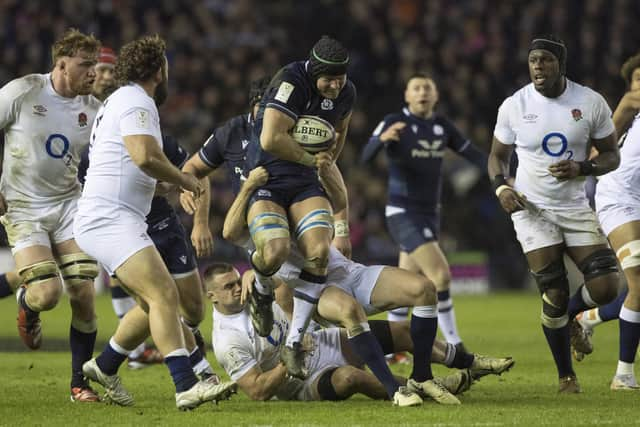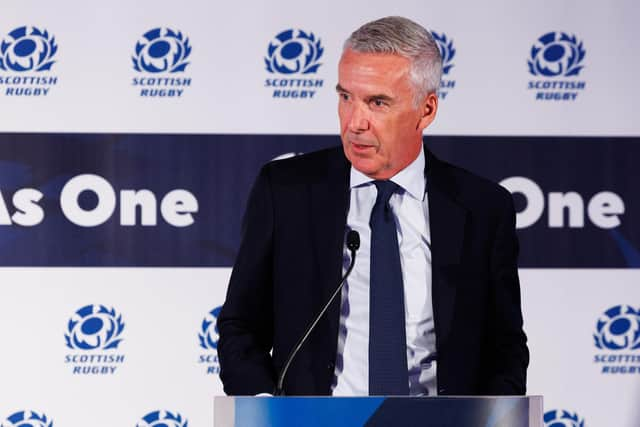Six Nations TV deal: Free-to-air must be an ‘integral part’ of new contract says Scottish Rugby chair John McGuigan
The governing body is in a state of flux; key personnel have left or are leaving and it’s fair to say his in-tray is full to overflowing as he looks to appoint a new chief executive, chief financial officer and performance director to steer the organisation away from choppy water.
With a £10.5 million hole in the SRU’s finances, every penny is a prisoner and McGuigan knows the next Six Nations broadcast deal will form a key part of his bid to drive up revenue. The current contract, which sees games split between BBC and ITV, is due to expire next year and the UK government has said there are no plans to force the rugby unions to offer the Six Nations to free-to-air broadcasters.
Advertisement
Hide AdAdvertisement
Hide AdWhile selling the rights to pay-TV organisations like Sky, TNT, Amazon on Netflix would undoubtedly raise more money, the cost of losing the exposure that comes with showing the matches on BBC and ITV could be incalculable.


McGuigan said this week that he wants to stop Scottish Rugby being a loss making business and to do that he aims to bump up revenue from £68 million to £100 million. Easier said than done of course, but a more lucrative TV deal would help and the former Standard Life and Phoenix Group executive is seeking government assistance.
“For the moment, every nation is working with their government about how we create that balance,” he said. “What you need from the government, who have a heavy influence over the free-to-air piece, is being realistic about if we’re trying to retain that right, you need to be realistic about what that means.
“You can’t just demand it as a principle and expect us to take a huge cut in our ability to drive revenue. We’ve got to find a point where it is equitable to give free access, but we don’t damage our revenue opportunity to a greater extent. It’s going to be finding the equilibrium. From our position, we would definitely want free-to-air as an integral part of any future deal.”
UK government ministers have been under pressure from Welsh MPs in particular to put the Six Nations on the so-called ‘crown jewels’ list of group A sporting events which currently includes the Rugby World Cup final, football World Cups, Olympic Games and Wimbledon finals. All have to be offered to free-to-air TV channels for live coverage.


The group A rules require that events on the list must be offered to the main free-to-air broadcasters on “fair and reasonable terms”. The Six Nations is not in the group A list, but is in group B, which says it can be on a subscription service as long as highlights are offered to free-to-air channels.
Concerns were raised last year that awareness of rugby could fall if the Six Nations went behind a paywall. On the other hand, with fewer young people watching television in the traditional sense, should the sport be striving to embrace new media opportunities?
The recent Netflix series Six Nations: Full Contact has helped take rugby to new audiences and a second series has been commissioned. It was one of the reasons why the six competing unions got into bed with CVC, the private equity firm which bought a 14.4 per cent stake in the Six Nations in 2021 in a deal valued at £365 million.
Advertisement
Hide AdAdvertisement
Hide AdMark Dodson, Scottish Rugby’s outgoing chief executive, said at the time that the CVC contract would be “transformational” for the sport in this country. McGuigan remains sceptical about its benefits. The initial amount for Scotland was announced as “around £7.4m (before costs) at completion”. With the total allocation for Scotland reaching “up to £44.5m (before costs) if Six Nations meets various future financial performance conditions”. The proceeds generated from this partnership are spread over a period of five years.
Prior to rugby, CVC’s chief involvement in sports had been through its heavy investment in Formula One and, according to McGuigan, the private equity firm soon found that working with six competing rugby nations was an entirely different ball game.
“CVC did the F1 thing and have realised dealing with rugby is not dealing with F1,” he said. “You don’t have a Bernie Ecclestone figure who says ‘Leave it with me and I’ll sort it’ - you’ve got multiple nations all coming at it from a different perspective.”
McGuigan believes it’s too early to pass judgment on the CVC deal but he has no doubt that external investment of this kind is essential if rugby is to thrive and grow. As things stand, CVC will play an integral role in any broadcast negotiations, and not just for the Six Nations. The new World Rugby Nations Championship, or Nations Cup, is scheduled to begin in 2026 and will be played across the existing July and November international windows on a bi-annual basis. It represents a whole new and lucrative broadcasting opportunity.
“I think it is too early to say if the CVC deal has been a success or not for rugby,” said McGuigan. “I think CVC would say it has been pretty challenging for them, given the amount of money they have invested, to see how they get their return. From that perspective on both sides there is a question: Has rugby been good for CVC? It is probably too early to say. Has CVC been good for rugby? It is probably still too early to say. The TV rights and the opportunity the Nations Cup presents, I think, is the time to answer that.
"I think the bigger question is can you see a way of rugby surviving without external support? I think definitely not. Whether it’s CVC or somebody else, that’s going to be part of the make-up of rugby going forward.”
Comments
Want to join the conversation? Please or to comment on this article.
